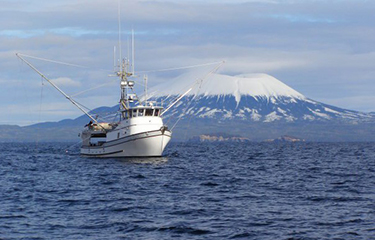The troll fishery in the southeast area of the U.S. state of Alaska is faced with a possible shutdown due to a lawsuit alleging the chinook salmon its catches is vital food for a struggling population of endangered killer whales.
In 2020, the Wild Fish Conservancy, an environmental nonprofit organization based in Seattle, Washington, U.S.A. sued the National Marine Fisheries Service, claiming its 2019 biological opinion did not properly account for the effects the fishery had on the Southern Resident population of killer whales and salmon that spawn in the U.S. states of Washington and Oregon, in violation of the Endangered Species Act. WFC blames the decline of the local killer whale population in Puget Sound – there are now 73 orcas in the pod, down from 98 in 1995 – on a decline in chinook salmon availability it blames partially on the fishery.
In its biological opinion, NMFS said the fishery’s incidental take would be offset by funding production of more chinook in Washington and Oregon hatcheries to "meaningfully increase" prey availability for the Southern Resident orcas, according to the Ketchikan Daily News. But in 2021, U.S. Magistrate Judge Michelle L. Peterson Chambers ruled the biological opinion issued by NMFS was out of compliance with the Endangered Species Act. The agency is currently rewriting its opinion, but the question remains whether the Alaska troll fishery will be able to operate or not.
In a ruling on an appeal of the case in December 2022, U.S. District Court Judge Richard Jones recommended the fishery be suspended under the incidental take statement, a provision within the Pacific Salmon Treaty that allows Alaska trollers to take wild chinooks throughout the year. A final decision by Jones is expected in February 2023.
According to Amy Daugherty, executive director of Alaska Trollers Association in Juneau, Alaska, action in the courts could precede the realignment of legal language.
“That leaves us in the precarious position of getting shut down,” Daugherty said.
The association has struggled with financing its representation in court, Daugherty said.
“We’re going it alone,” Daugherty said. “We’ve been doing a lot of fundraising.”
Meanwhile, the Wild Fish Conservancy, the state of Alaska and the Alaska Trollers Association have entered the fray in a battle of data as it relates to how many chinooks will make it to the bellies of the beleaguered killer whales under NMFS’ amended plan.
The Wild Fish Conservancy claims that 97 percent of the troll-caught chinooks originate in drainages outside of Alaska. The Alaska Department of Fish and Game, meanwhile, estimates that between 30 and 80 percent of the fish in the harvest come from drainages outside of Alaska, and that the percentages vary each year.
Additional information gleaned from in-fishery sampling of the troll fishery estimates that the Alaska fleet caught a total of 917 chinooks of Puget Sound origin in a period from 2009 to 2018.
Daugherty and others fault dams, pollution, whale watching, and other stressors throughout the Pacific Northwest as critical factors in the dwindling killer whales.
“We’re catching less than half of our [salmon] allocation all these years, and now they’re pointing their fingers at us,” she said.
Jeff Farvour, a Sitka, Alaska-based salmon troller and Alaska Trollers Association board member, said the fleet doesn’t have any significant impact on the Southern Resident killer whale population.
"Their range is from Southern California to Haida Gwaii. The farther you get from their epicenter in Puget Sound, the less impact fishing will have on their access to prey,” he said.
Farvour said fishing moratorium would wipe out the tax base of many small communities in Southeast Alaska.
"Clearly our community will suffer severe economic hardship if the Southeast Alaska troll fishery is closed," Farvour said. "Each troller and commercial fishing operation is a small business.”
Several Southeast Alaska communities have contributed to the fishery’s legal defense fund, including Craig, Petersburg, Meyers Chuck, Pelican, and Sitka, which has contributed USD 25,000 (EUR 23,000).
Alaska Department of Fish and Game Commissioner Doug Vincent-Lang wrote in a declaration submitted to Jones the trollers face a loss of up to one third of their total earning potential if the fishery is closed.
Doug Vincent-Lang has said his department is prepared to dedicate resources toward an appeal if Jones rules the fishery must be shut down.
Reporting by Charlie Ess
Photo courtesy of H. Weinberg/Alaska Trollers Association







